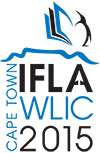
IFLA’s Information Technology, Public Libraries and Asia and Oceania Sections together with the Library and Research Services for Parliaments Section are seeking proposals for papers to be presented at a session during the IFLA World Library and Information Congress in Cape Town, South Africa 15-21, August 2015.
Libraries (and research centres) play a central role in facilitating access to information, particularly in supporting community-based solutions to meet the information needs around development. We are seeking papers that illustrate significant information technology projects that realize the principles of the Lyon Declaration in:
• Helping citizens exercise their civil, political, economic, social and cultural rights
• Ensuring accountability and transparency and good governance and empowerment
• Illustrating practical application of technology supported by libraries in fostering development goals through access to information
• Measuring progress on public and private commitments on sustainable development.
• Information technology enabling citizens to communicate and exchange information with government
The Lyon Declaration was launched at the IFLA congress in Lyon in August 2014. This session provides an opportunity to share information technology projects that support the goals of this declaration.
Papers presenting innovative projects, experience, initiatives or services with a strong collaborative cross-border or international dimension are preferred. Papers should reflect the conference theme, “Dynamic Libraries: Access, Development and Transformation”.
The program will feature up to five presentations of 15-20 minutes each with additional time for questions.

